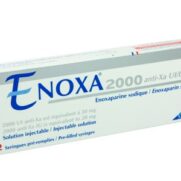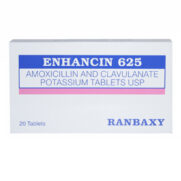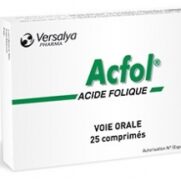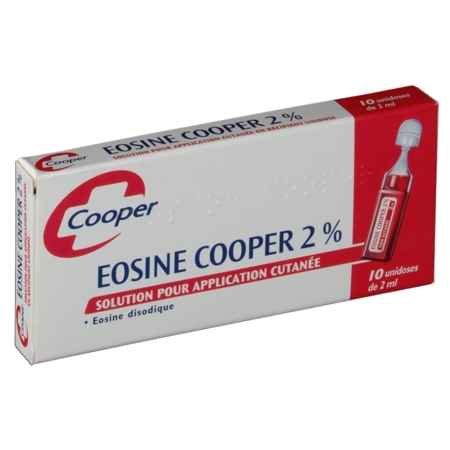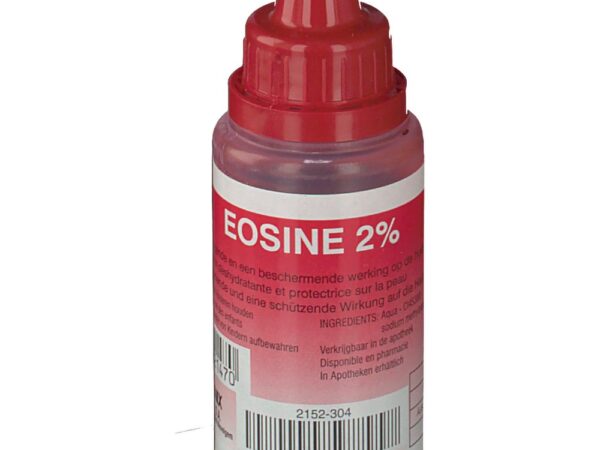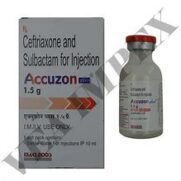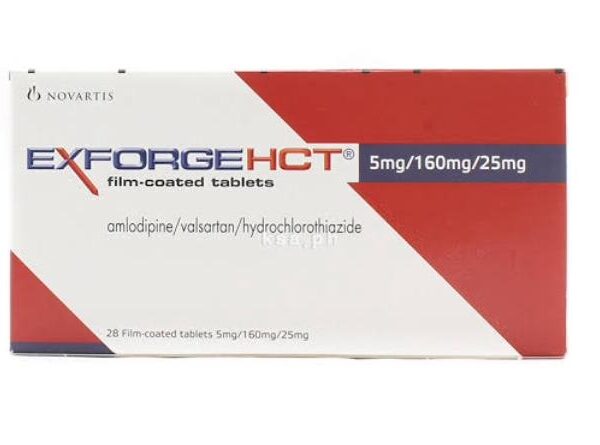WHAT EXFORGE HCT AND WHAT IT IS USED
Exforge HCT tablets contain three substances called amlodipine , valsartan and hydrochlorothiazide. All three of these substances help to control high blood pressure.
– Amlodipine belongs to a group of substances called " calcium channel blockers" . Amlodipine stops the passage of calcium in the blood vessel wall , thereby preventing the contraction of blood vessels.
– Valsartan belongs to a group of substances known as angiotensin -II receptor blockers. Angiotensin II is produced by the body and causes the contraction of blood vessels , thereby increasing blood pressure . Valsartan works by blocking the effect of angiotensin II.
– Hydrochlorothiazide belongs to a group of substances called " thiazide diuretics " . Hydrochlorothiazide increases urine output , which also lowers blood pressure.
As a result of the action of the three mechanisms , the blood vessels relax and blood pressure is lowered.
Exforge HCT is used to treat high blood pressure in adult patients already taking amlodipine , valsartan and hydrochlorothiazide and who would be beneficial to take one tablet containing all three substances.
2 . BEFORE YOU TAKE EXFORGE HCT
Do not take Exforge HCT
– If you are pregnant after 3 months. ( Better to avoid the use of Exforge HCT in early pregnancy – see section "Pregnancy " ) .
– If you are allergic (hypersensitive ) to amlodipine , valsartan , hydrochlorothiazide , sulfonamide derivatives (medicines used to treat chest or urinary infections) or any of the other ingredients of Exforge HCT ( see section 6, " What does Exforge HCT" ) .
If you think you may be allergic , do not take Exforge HCT and talk to your doctor.
– If you have liver disease , destruction of small bile ducts in the liver ( biliary cirrhosis) , leading to accumulation of bile in the liver ( cholestasis ) .
– If you have severe kidney problems or if you are on dialysis.
– If you can not urine ( anuria ) .
– If you have very low levels of potassium or sodium in the blood despite treatment .
– If you have too high levels of calcium in the blood, despite treatment .
– If you have gout ( uric acid crystals in the joints).
If any of the above apply to you , do not take Exforge HCT and talk to your doctor.
Take special care with Exforge HCT
– If you have low levels of potassium or magnesium in the blood ( with or without symptoms such as muscle weakness , muscle spasms, irregular heartbeat ) ;
– If you have low levels of sodium in the blood ( with or without symptoms such as fatigue , confusion, muscle twitching , convulsions ) ;
– If you have high levels of calcium in the blood ( with or without symptoms such as nausea , vomiting, constipation , stomach pain , frequent urination , thirst, muscle weakness and fibrillation) ;
– If you are taking medicines or substances that increase the amount of potassium in the blood. These include potassium supplements or salt substitutes containing potassium, potassium- sparing medicines and heparin. You may need potassium levels in your blood to be regularly checked ;
– If you have kidney problems you have had a kidney transplant or are told that you have a narrowing of the renal arteries ;
– If you have liver problems ;
– If you have or have had heart failure or coronary artery disease, especially if you are taking the maximum dose of Exforge HCT ( 10 mg/320 mg/25 mg);
– If your doctor has told you that you have a narrowing of the valves of the heart ( called "aortic or mitral stenosis " ) or that the thickness of the heart muscle is abnormally increased (called " obstructive hypertrophic cardiomyopathy " ) ;
– If you have hyperaldosteronism . This is a condition in which the adrenal glands produce too much of the hormone aldosterone. If this applies to you , do not recommend the use of Exforge HCT;
– If you have a disease called systemic lupus erythematosus ( also called " erythematosus " or " SLE" ) ;
– If you have diabetes ( high blood sugar) ;
– If you have high levels of cholesterol or triglycerides in the blood ;
– If you experience skin reactions such as rash after sun exposure ;
– If you have had allergic reactions to other medications to treat high blood pressure or diuretics ( a type of medicine known as ' water tablets '), especially if you have asthma or allergies;
– If you are sick (vomiting or diarrhea) ;
– If you experience dizziness and / or you faint during treatment with Exforge HCT, tell your doctor immediately;
– If you have impaired vision or eye pain . These may be symptoms of raised pressure in the eye , and can occur within hours to weeks after you start taking Exforge HCT. This can lead to permanent visual impairment if not treated.
If any of the above applies to you , talk to your doctor.
You should tell your doctor if you are ( or think you might become) pregnant. Exforge HCT is not recommended in early pregnancy, and must not be taken if you are pregnant after 3 months , as it may cause serious harm to your baby if used at that stage ( see section "Pregnancy and lactation " ) .
Not recommended the use of Exforge HCT in children and adolescents under 18 years.
Exforge HCT and the elderly ( aged 65 years and over)
Exforge HCT can be used in patients aged 65 years or more in the same dose as adults and in the other in the same manner as received until the three substances called amlodipine , valsartan and hydrochlorothiazide. Elderly patients , particularly those receiving the maximum dose of Exforge HCT ( 10 mg/320 mg/25 mg), should monitor their blood pressure regularly .
Taking other medicines
Please tell your doctor or pharmacist if you are taking or have recently taken any other medicines, including medicines obtained without a prescription. You may need your doctor to change the dose or take other precautions. In some cases, you may need to stop taking one of the medicines . This is especially important if you are taking any of the medicines listed below :
Do not take together with:
• lithium ( a drug used to treat some forms of depression ) ;
• medicines and substances that increase the level of potassium in the blood. These include potassium supplements or salt substitutes containing potassium, potassium- sparing medicines and heparin.
Take caution with :
• alcohol , sedatives and anesthetics ( medicines that allow patients to undergo surgery and other procedures) ;
• amantadine ( a drug for the treatment of Parkinson's disease , and for treating and preventing certain diseases caused by viruses) ;
• anticholinergic agents ( medicines that are used to treat a variety of disorders such as gastrointestinal spasms, bladder spasms , asthma , motion sickness , muscular spasms , Parkinson's disease and as a part of the medication in anesthesia ) ;
• anticonvulsants and mood stabilizers , drugs used for the treatment of epilepsy and bipolar disorders (e.g., carbamazepine, phenytoin, fosphenytoin , primidone ) ;
• cholestyramine, colestipol or other resins ( substances used mainly to treat high levels of lipids in the blood) ;
• simvastatin ( a drug used to control high cholesterol) ;
• ciclosporin ( a medicine used in transplantation to prevent rejection of a transplanted organ or for other diseases , e. Rheumatoid arthritis or atopic dermatitis ) ;
• cytotoxic drugs (used to treat cancer) , such as methotrexate or cyclophosphamide ;
• digoxin or digitalis ( drugs used to treat heart disease ) ;
• verapamil , diltiazem ( heart medicines) ;
• iodinated contrast agents ( agents that are used in imaging studies ) ;
• drugs for the treatment of diabetes (oral agents such as metformin, or insulin ) ;
• medicines for gout , such as allopurinol ;
• Medicines that may increase blood sugar levels (beta blockers, diazoxide ) ;
• drugs that may induce "torsades de pointes" ( irregular heartbeat ) , as antiarrhythmics ( medicines that are used to treat heart problems) and some antipsychotics ;
• medications that can reduce the amount of sodium in the blood, such as antidepressants , antipsychotics, antiepileptics ;
• medications that can reduce the amount of potassium in the blood, diuretics (water pills) , corticosteroids , laxatives , amphotericin or penicillin G;
• medications for high blood pressure , such as adrenaline or noradrenaline is implicated;
• medicines used for HIV / AIDS ( eg ritonavir , indinavir, nelfinavir) ;
• medicines used to treat fungal infections (eg ketoconazole , itraconazole ) ;
• medicines to treat ulcers and inflammation of the esophagus ( karbenolokson ) ;
• medications to relieve pain and inflammation , especially non-steroidal anti-inflammatory drugs (NSAIDs ) , including selective cyclooxygenase- 2 inhibitors ( COX-2 ) inhibitors ;
• muscle relaxants (drugs used to relax the muscles that are used during operations ) ;
• nitroglycerin and other nitrates, or other substances called " vasodilators" ;
• other drugs for the treatment of high blood pressure , including methyldopa ;
• rifampicin (used for example for the treatment of tuberculosis ) ;
• St. John's wort ;
• dantrolene (infusion in severe abnormalities in body temperature ) ;
• vitamin D and calcium salts.
Consult with your doctor before you drink alcohol. Alcohol can lower excessive blood pressure and / or increase the ability to feel dizzy or make you feel faint .
Taking Exforge HCT with food and drink
You can take Exforge HCT with or without food. People taking Exforge HCT, should not consume grapefruit or grapefruit juice. The reason for this is that the grapefruit and grapefruit juice may lead to increased plasma levels of the active ingredient amlodipine , which in turn may lead to unpredictable enhance the antihypertensive effect of Exforge HCT.
Pregnancy and lactation
pregnancy
You should tell your doctor if you think you are pregnant or may become pregnant. Your doctor will advise you to stop taking Exforge HCT before you become pregnant or as soon as you know you are pregnant and will advise you to take another medicine instead of Exforge HCT. Exforge HCT is not recommended in early pregnancy, and must not be taken if you are pregnant after 3 months , as it may cause serious harm to your baby if used after the third month of pregnancy.
breastfeeding
Tell your doctor if you are breastfeeding or plan to breastfeed . Treatment with Exforge HCT is not recommended for mothers who are breastfeeding , your doctor may order other treatment , if you wish to breast-feed , especially if your baby is newborn, or was born prematurely.
Ask your doctor or pharmacist before taking any medicine .
Driving and using machines
Like many other medicines used to treat high blood pressure, this drug may make you dizzy . If you experience this symptom, do not drive or operate machinery.
3 . HOW TO TAKE EXFORGE HCT
Always take this medicine exactly as your doctor tells you . If you are not sure, ask your doctor. This will help you achieve the best results and lower the risk of side effects.
The usual dose of Exforge HCT is one tablet per day.
– It's best to take the tablets at the same time each day , preferably in the morning .
– Swallow the tablet whole with a glass of water.
– You can take Exforge HCT with or without food. Do not take Exforge HCT with grapefruit or grapefruit juice.
Depending on how you respond to treatment, your doctor may suggest a higher or lower dose .
If you take more than the amount of Exforge HCT
If you accidentally take too many tablets of Exforge HCT, immediately contact your doctor. You may need medical attention.
If you forget to take Exforge HCT
If you forget to take a dose , take it as soon as you remember and then take your next dose at the usual time . If it is almost time for your next dose, just take your next tablet at the usual time. Do not take a double dose (two tablets at once) to make up for a forgotten tablet.
If you stop taking Exforge HCT
Discontinuation of treatment with Exforge HCT may worsen your condition. Do not stop taking your medicine unless your doctor tells you to do so.
Always take the medicine even if you feel well
People who have high blood pressure often do not notice any signs of the problem. Many feel normal. It is very important that you take this medicine exactly as your doctor tells you to get the best results and reduce the risk of side effects. Keep your appointments with your doctor even if you feel well.
If you have any further questions on the use of this product, ask your doctor or pharmacist.
4 . POSSIBLE SIDE EFFECTS
Like all medicines , Exforge HCT can cause side effects, although not everybody gets them .
These side effects may occur with certain frequencies, which are defined as follows:
very common : affects more than 1 user in 10;
common: affects 1 to 10 users in 100 ;
uncommon: affects 1 to 10 users in 1000 ;
rare: affects 1 to 10 users in 10,000 ;
very rare : affects less than 1 user in 10 000 ;
not known from the available data can not be estimated frequency .
Some side effects can be serious and need immediate medical attention:
Go with your doctor immediately if you experience any of these symptoms :
Common
· dizziness
· Low blood pressure (feeling of faintness , fainting, sudden loss of consciousness)
Uncommon
· Strong reduction in urine output (decreased renal function)
rare
· Spontaneous bleeding
· Irregular heartbeat
· Liver disorder
very rare
· An allergic reaction with symptoms such as rash , itching
· Angioedema : swelling of the face or lips or tongue , difficulty breathing
· Pressing / tightening chest pain that increases or does not go away
· Weakness , bruising , fever and frequent infections
· stiffness
Other possible side effects of Exforge HCT:
Common
· Stomach discomfort after eating
· fatigue
· swelling
· Low levels of potassium in the blood
· headache
· Frequent urination
Uncommon
· palpitations
· dizziness
· Visual disturbances
· Stomach discomfort
· Pain in the chest
· Increase of urea , creatinine and uric acid
· High levels of calcium , sodium or fat in blood
· Low blood potassium levels
· Bad Breath
· diarrhea
· Dry Mouth
· nausea
· vomiting
· Abdominal pain
· Weight gain
Loss of appetite
· Taste disturbances
· Back pain
· Swelling of the joints
· Muscle cramps / weakness / pain
· Pain in the extremities
· Irregularities in standing or walking
· weakness
· Coordination disorders
· Dizziness when standing up or after exercise
· Lack of energy
· Sleep Disorders
· Tingling or numbness
· neuropathy
· drowsiness
· Sudden , brief loss of consciousness
· Reduction in blood pressure on standing
· impotence
· cough
· shortness of breath
· Sore throat
· Excessive sweating
· itching
· Swelling , redness and pain along a vein
· Flushing
· tremor
Not known
· Changes in blood tests to assess kidney function , increased levels of potassium in the blood, reducing the number of red blood cells.
Side effects that have been reported in self- administration of amlodipine or valsartan or hydrochlorothiazide but were not seen in Exforge HCT or observed with a higher frequency:
amlodipine
Common
· palpitations
· Abdominal pain
· nausea
· drowsiness
· Hot flashes
Uncommon
· Tinnitus
· Changes in motility
· pain
· Drop weight
· Joint pain
· tremor
• Changes in mood
· Interference with urination
· Nocturia
· Breast enlargement in men
· fever
· hair loss
· Skin eruptions
· Purple spots on the skin
· rash
· Change in skin color
very rare
· Reduction in the number of white blood cells and platelets
· Irregular heartbeat
· Coronary event
· Inflammation of the gastric mucosa or pancreas , enlarged gums , abnormal assessment of liver function
· Liver problems, which may occur together with yellow skin and eyes, or dark urine
· Allergic reactions including swelling of the skin in depth and difficulty breathing
· High blood sugar
· Increased muscle stiffness
· Skin reactions with redness and peeling of the skin, blistering of the lips , eyes or oral mucosa
· Itchy rash
· Inflammation of blood vessels
Not known
· Stiffness of the limbs and trembling hands
valsartan
Not known
· Abnormal test results in red blood cells
· A decrease in the number of certain types of white blood cells and platelets
· Increase in blood potassium
· Increase in blood creatinine
· Abnormal assessment of liver function
· Allergic reactions including swelling of the skin in depth and difficulty breathing
· Muscle pain
· Greatly reduce the amount of urine
· itching
· rash
· Inflammation of blood vessels
hydrochlorothiazide
very common
· Low levels of potassium in the blood
· Raising blood lipids
Common
· High levels of uric acid in the blood
· Low levels of magnesium in the blood
· Low levels of sodium in the blood
· Dizziness, fainting when standing up
· Decreased appetite
· Nausea and vomiting
· Itchy rash and other types of rash
· Inability to achieve or maintain an erection
rare
· Low levels of platelets ( sometimes with bleeding or bruising of the skin)
· Urinary glucose
· High blood sugar
· Worsening of diabetes
· Low mood (depression)
· Irregular heartbeat
· Stomach discomfort
· constipation
· Liver problems, which may occur together with yellow skin and eyes, or dark urine ( hemolytic anemia)
· Increased sensitivity of skin to sun
· Purple spots on the skin
· Renal impairment
very rare
· Fever, sore throat or mouth sores , frequent infections (absence or very low levels of white blood cells)
· Pale skin, fatigue , shortness of breath , dark urine ( hemolytic anemia, abnormal breakdown of red blood cells in the blood vessels or elsewhere in the body)
· Confusion, fatigue, muscle twitching and spasms , rapid breathing ( hypochloremic alkalosis)
· Severe pain in the upper stomach ( inflammation of the pancreas)
· Rash , itching, hives, difficulty breathing or swallowing , dizziness ( hypersensitivity )
· Difficulty breathing with fever , cough, wheeze , shortness of breath ( respiratory distress, pulmonary edema, pneumonitis )
· Facial rash , joint pain , muscle disorders , fever ( lupus erythematosus )
· Inflammation of blood vessels with symptoms such as rash, purplish-red spots , fever (vasculitis )
· Severe skin disease that causes a rash , redness, blistering of lips, eyes or mouth , skin peeling , fever ( toxic epidermal necrolysis)
Not known
· Weakness, bruising and severe infections ( aplastic anemia)
· Reduce vision or eye pain due to increased pressure ( possible symptoms of acute glaucoma)
· shortness of breath
· Greatly reduce the amount of urine ( possible signs of renal dysfunction or renal failure)
· Serious skin disease that causes rash, red skin , getting blisters on lips , skin peeling , fever (erythema multiforme)
· Muscle cramps
· Fever ( pyrexia)
If any of the side effects gets serious, or you notice other effects not listed in this leaflet , please tell your doctor or pharmacist.
5 . HOW TO STORE EXFORGE HCT
Keep out of reach of children.
Do not use Exforge HCT after the expiry date stated on the carton and blister after ( EXP :/ EXP). The expiry date refers to the last day of that month.
Do not store above 30 ° C.
Store in the original package to protect from moisture.
Do not use containers of Exforge HCT, which is damaged or signs of tampering.
6 . ADDITIONAL INFORMATION
What does Exforge HCT
– The active substances of Exforge HCT are amlodipine ( as amlodipine besylate) , valsartan and hydrochlorothiazide.
– Exforge HCT 5 mg/160 mg/12, 5 mg film-coated tablets : Each tablet contains 5 mg amlodipine (as amlodipine besylate) , 160 mg valsartan and hydrochlorothiazide 12,5 mg . The other ingredients are cellulose microcrystalline , crospovidone , silica colloidal anhydrous , magnesium stearate , hypromellose , macrogol 4000 , talc , titanium dioxide (E171).




